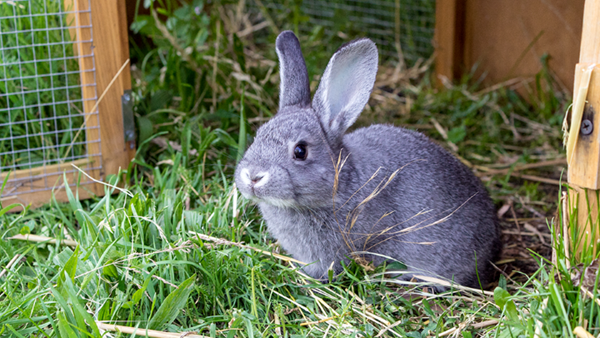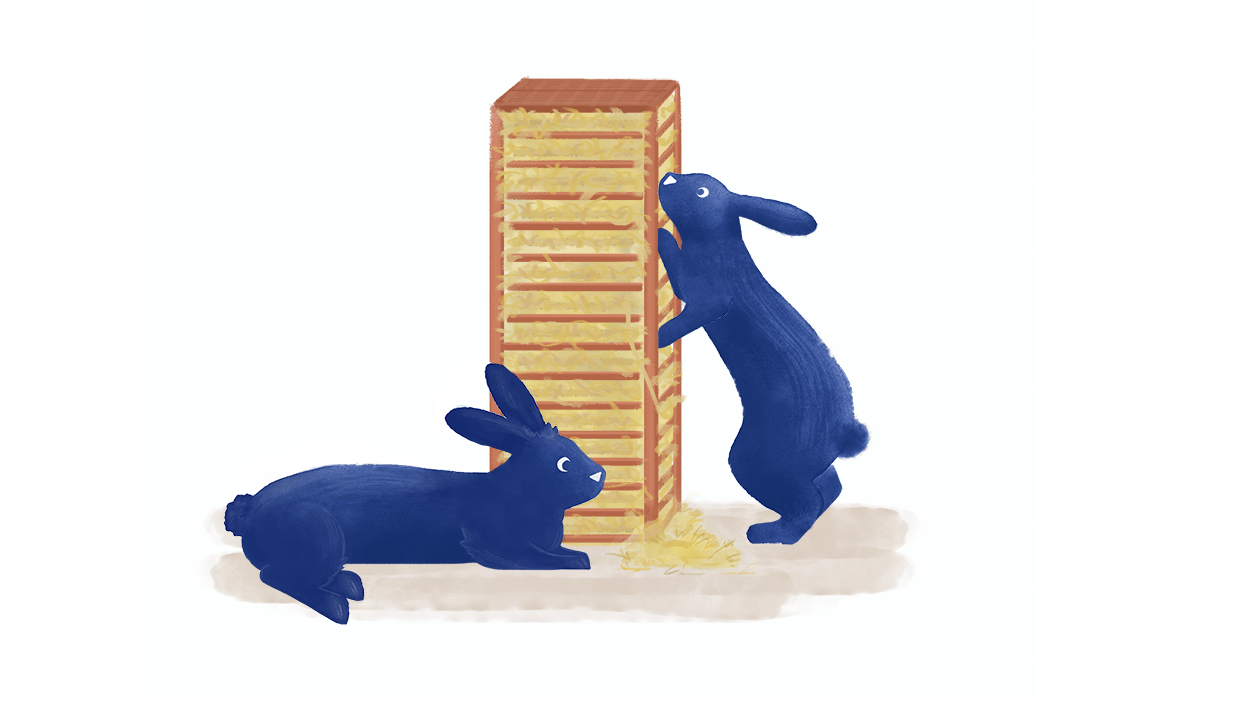Worms In Rabbits
Worms in rabbits are much less common than in cats or dogs but they can still pick up these wriggly parasites. If you know the signs to look out for you can get your rabbit quick treatment and keep them in top health.

What kinds of worms can my rabbit get?
The main type of worm rabbits get is called the pinworm which they pick up through eating the droppings of another infected rabbit (eating droppings is an essential part of their normal diet and digestive cycle). They’ll typically be exposed through their parent, breeder or at a pet store or rescue centre.
Pinworms in rabbits
Pinworms don’t usually cause any serious health problems in rabbits and can go undetected for a long time. However, they can cause itching and discomfort around your rabbit’s bottom.
Tapeworms in rabbits
Rarely, rabbits can be infected with tapeworms or stomach worms. Rabbits can’t pass on tapeworms, unless they are preyed upon by a predator, as tapeworms can’t complete their life cycle in your rabbit. However, tapeworms can cause them to develop skin and liver cysts.
Signs and symptoms of worms in rabbits
Often there will be no symptoms at all or only very mild ones. You might notice your rabbit scratching and biting a lot around their bottom or tiny white worms around their anus or in their faeces. Weight loss or poor coat condition can also be signs of an established worm infestation.
Baby rabbits are often more severely affected than adults and signs can include lethargy, substantial weight loss and diarrhoea.
What is worming treatment?
Worming treatment is an anti-parasitic agent which normally kills the live worms and eggs. It is easy to administer and shouldn’t cause your rabbit any discomfort.
At the same time as giving them the treatment, you’ll also need to increase cleaning of your rabbit’s play area, removing all faeces until the infection has cleared up. You also need to be mindful of wild rabbits getting into your garden, especially if they can access areas your pets can too.
Why should I give my rabbit worming treatment?
Unlike cats and dogs, rabbits don’t need a regular worming treatment because it’s less common for them to get worms. If you suspect they have worms, it’s best to get it confirmed by your vet who can prescribe the right course of treatment. Many parasiticide products may have environmental impacts, which we are committed to reducing. You can discuss with your vet ways to help reduce the detrimental effects. Some parasites will also be resistant to certain medications. Your vet will be able to advise you what is best for your pet.
A simple course of deworming is normally enough to resolve any problems though if it’s severe and your rabbit has stopped eating, they may need more ongoing support.
Can indoor rabbits get worms?
Indoor rabbits aren’t immune to parasites but if they’re kept inside your home, then you’re lessening the chances of them picking them up from another animal or wild rabbit. Unless of course you also have cats or dogs, in which case they could still get worms from them. A regular preventative worming programme for your other pets should help protect your rabbit too.
What age should I get my baby rabbit (kit) wormed for the first time?
As rabbits are less prone to worms you don’t need to get them treated when they’re young. If you’re at all concerned or suspect worms, then speak to your vet who will be able to advise you on the right course of action and any preventative treatments you can use.
How do I prevent my rabbit getting worms?
You should clean your rabbit’s area regularly and keep any dogs and cats out of their grazing area. You should also clear up any other pets’ mess in the garden straight away. Try to exclude foxes from your garden and any areas your rabbit might graze as much as possible. If you spot any signs of a fox, clear it up immediately.
Try to rotate the areas your rabbit grazes regularly and limit the number of rabbits you keep, if possible, to reduce living density. Try also to avoid picking wild greens from areas where other animals may have been.
How should I worm a rabbit?
Worming treatment is often given to your rabbit as a paste which you squeeze into their mouth. It may also come as a liquid or powder which you mix in with their food or water. Your vet will advise you on the right option depending on the species you have.
If you suspect worms in your pet, please speak to your local Medivet.
Spread the cost of worming treatments with the Medivet Health Plan
When you sign up to the Medivet Health Plan, your rabbit's worming treatments are included in the monthly cost. This enables you to spread the cost of worming treatments and receive reminders when a worming is due.
Other benefits of the Medivet Healthcare Plan include:
- Full course of vaccinations
- Complete flea, worm and tick protection for the year
- Six month health check by a vet
- Discounts on vet care, dental and food
- Microchipping (if required)
Find your local practice
Related Articles

Rabbits And Myxomatosis
Vaccinate your rabbit every 12 months to protect them against contracting Myxomatosis.
Read article
Rabbit Neutering
Spaying rabbits can help them live longer whilst enjoying a happier, healthier life.
Read article
Vaccinating Your Rabbit
Find out more about rabbit vaccinations including what vaccinations are required and when.
Read article

